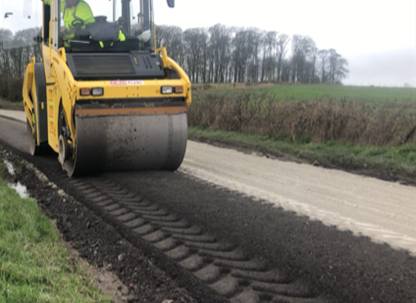
Highways service launches plan to cut CO2 emissions
Lancashire County Council has revealed new plans to save thousands of tonnes of carbon by revolutionising the way it maintains our roads.
The council's first Highways Decarbonisation Strategy is due to be considered by the council's cabinet at its meeting on Thursday 7 April.
According to a new report the strategy reflects the county council's wider plans to transition Lancashire's economy away from carbon and address the biodiversity crisis.
It outlines that since 2009 the council has already reduced carbon emissions by over 86,400 tonnes, and saved almost £40m in energy costs with measures such as converting streetlights to using LED lamps. Further progress is being made with the introduction of new repair techniques such as recycling asphalt when resurfacing roads, which is predicted to save a further 267 tonnes of carbon over the next year.
The new strategy will provide a basis for saving carbon across all aspects of the council's highway maintenance operations, beginning with calculating its current carbon output to establish a baseline in order to map out a route to net zero.
Actions outlined in the report include:
- Training staff to be able to calculate the carbon output of materials over the lifecycle of a project in order to choose the lowest carbon option.
- Considering lower-carbon options when renewing items. For example, replacing internally lit bollards at pedestrian crossings with unlit reflective bollards.
- Mapping energy efficiency of highways depots to target the most effective solutions such as LED lighting, and improved insulation.
- Making use of in-vehicle technology to influence behaviour and encourage staff to conserve fuel when driving as part of their job.
- Where possible move away from using petrol and diesel fuelled vehicles towards alternatives such as electric or hydrogen.
- Working with universities to develop new technology – such as drones capable of carrying out bridge inspections, replacing the need for carbon-intensive access equipment and road closures.
Phil Durnell, director of highways and transport, said: "Lancashire County Council is currently looking at how we can reduce our carbon emissions in everything we do, and this strategy is the starting point for making further savings as part of our highway maintenance operations.
"We've already taken one of the most effective carbon-reduction measures available to us by changing our 125,000 streetlights to use LED lamps, with work on this currently nearing completion.
"We're also increasingly recycling the materials used to construct our roads, and reusing them immediately as we lay the new surface, which over time will produce significant savings.
"We've previously invested in 150 public charging points for electric vehicles, and the future will involve adopting this type of technology for our own vehicles where possible, as well as exploring new opportunities as they emerge.
"Our next task is to estimate the carbon output of all our highways maintenance activities and, in the short term, identify the next round of 'quick win' opportunities to reduce carbon in our day-to-day operations, particularly among those which are most energy intensive.
"This new strategy also outlines a number of actions beyond this which we need to take over the coming years to engrain decarbonisation throughout our working culture, and minimise carbon output across the full range of our highways operations.
"The funding we receive from the Department for Transport is also based on being able to demonstrate good value, and that we're using their recommended approach of 'prevention is better than cure' in the way we maintain our roads. It is likely that in the near future retaining our top 'tier 3' level of funding will also depend on being able to show that we're monitoring, and considering carbon efficiency, in everything we do."
Notes to editors
Picture shows existing road surface being recycled and relaid, helping to avoid new asphalt being needed.
